News
KUBS News
2023 MSBA 4th Capstone Project Final Presentation Successfully Concluded
On January 22nd (Monday), the final presentation of the 2023 MSBA Capstone Project, hosted by the Center for Digital Transformation & Business (hereinafter referred to as CDTB, Director=Park Kyung Sam) of Korea University's Business School (Dean=Kim Sang Yong), took place at the LG-POSCO Building's Soodang CLC on the third floor. The participating students were from the general graduate school's Department of Business Administration, majoring in Business Analytics. Formed into 9 teams, the students utilized data provided by collaborating corporations to analyze existing businesses and conceive new business models for their presentations. This event saw the attendance of presenters, collaborating company representatives, and faculty, who evaluated the projects that had been ongoing for a year and confirmed the eligibility for the university's master's degree. The 4th capstone project's collaborating corporations included a total of 7 entities: △LG CNS, △Kyobo Life Insurance, △PwC, △E-Land, △Korea Credit Information Services, △Hyundai Motor Company, and △LG Household & Health Care.
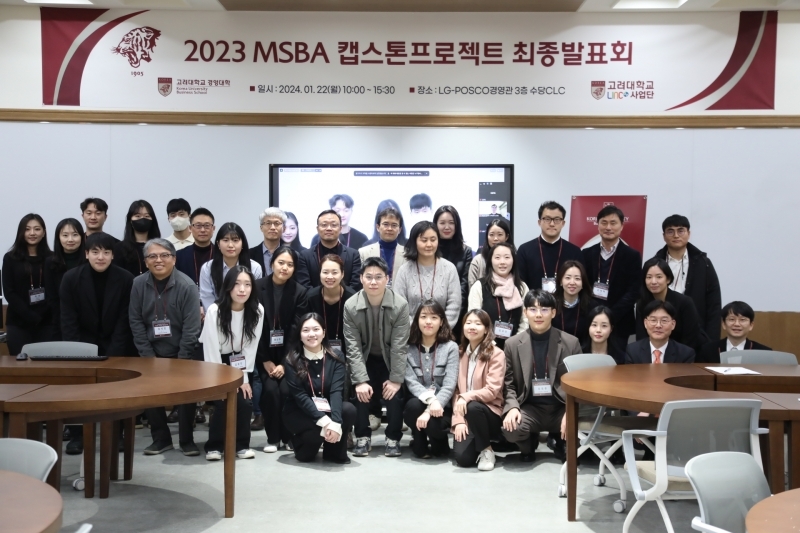
Team 1 (Heeseok Kim, Eunbyul Shin) presented on the topic of 'Customized Chatbot Construction Utilizing LLM and RAG for Companies'. As domestic companies have begun to adopt and utilize generative AI, Team 1 aimed to construct a customized LLM chatbot that could effectively search and learn internal information related to the company's consulting business. Through pilot testing, they received significant feedback indicating the willingness to use this technology as an auxiliary means. A representative from LG CNS positively evaluated the project, noting that despite concerns about operational security, the company could make good use of the outcomes. Professor Lee Gunwoong, the team's advisor, also provided a passing grade, mentioning, "Although it's not ready to be a main tool in companies, it has achieved significant results in extracting meaningful data."
Team 2 (Seunghyun Lee) conducted research on 'Bond Interest Rate Prediction'. Team 2 attempted to construct a model predicting bond interest rates using various real economy indicators, focusing on 10-year maturity bonds. During the process, they encountered difficulties with model prediction accuracy and variable setting. A representative from Kyobo Life Insurance highly praised the effort, as it aligned with the spirit of industry-academic cooperation and mentioned that the company could fully utilize the project's outcomes, as they had been conducting many similar research on the same topic as well. Professor Kim Jeunghyun, the team's advisor, noted the student's enthusiasm and awarded a passing grade for providing meaningful data to Kyobo Life Insurance after much effort.
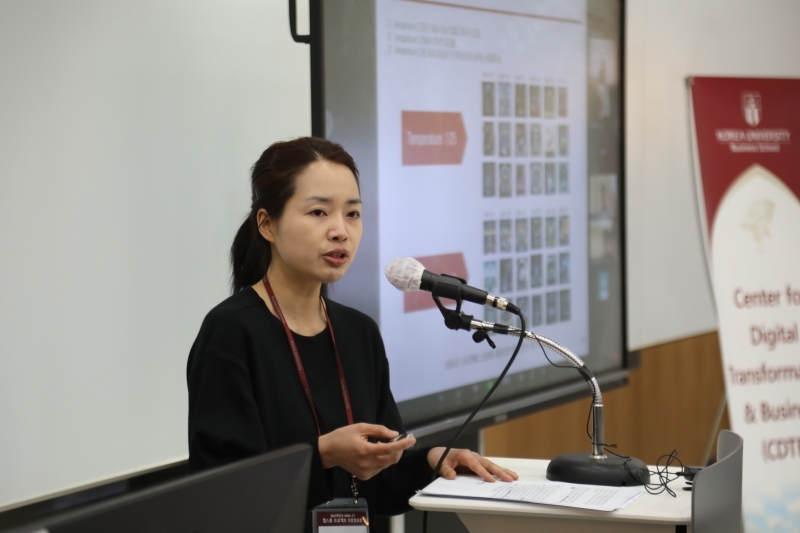
Team 3 (Heejae Kim, Sunju Hwang) was in charge of research on 'Deriving Target Client Groups through Corporate Pension Client Segmentation'. With the corporate pension market growing rapidly, the importance of corporate clients has significantly increased, setting the stage for their research topic. They aimed to support Kyobo Life Insurance's decision-making by classifying prospective corporate clients into 5 groups based on their likelihood of enrollment. A Kyobo Life Insurance representative valued the practical application of real sales data in the results, stating that insights obtained could guide future sales activities. Professor Kim Jaehwan, the team's advisor, remarked on the research's origins from considerations on how to improve the sales success rate of salespersons, which is only 10%, and expressed a desire to pass the team, despite some shortcomings, with further improvements.
Team 4 (Boram Cho, Boyeon Ham) researched whether increasing human intervention in marketing practices, such as advertising and UI creation using GPT, improves the quality of the output. This research started from the assumption that GPT still plays a supportive role in marketing. However, the project findings indicated that human intervention could sometimes negatively affect the results. Therefore, Team 4 suggested utilizing GPT not just as a supportive role but as an 'Augmented tool'. They explained that even non-experts in the design field could quickly and cost-effectively produce initial drafts using GPT. A PwC representative praised the topic's recent relevance in the industry and the lack of preceding materials on using it for business, commending the excellent results presented. Professor Kim Baeho also lauded the project, attributing its success to the students' professional backgrounds.
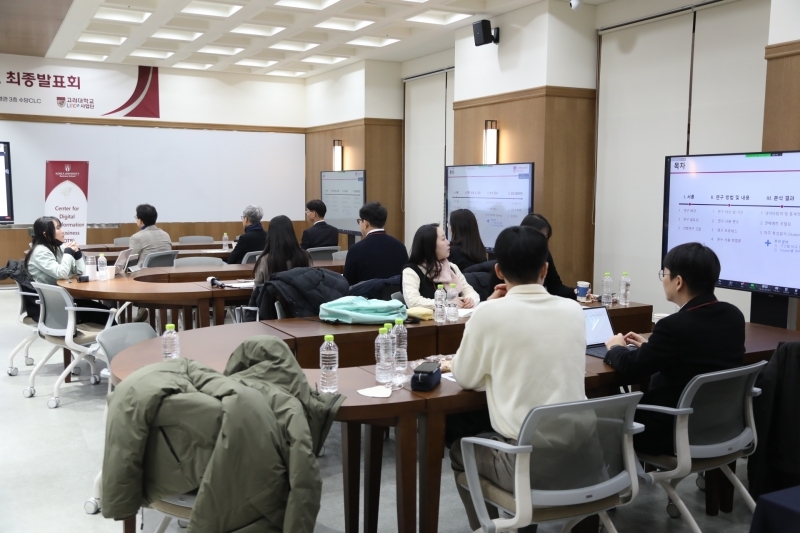
Team 5 (Yebin Ko, Doyun Kim) presented on 'Formation of SPAO's Distribution System and Sales Volume Prediction Model Using Machine Learning'. The research aimed to improve the accuracy of product distribution across SPAO stores to increase sales and minimize stock transfers between stores. An E-Land representative mentioned planning to refer to the insights regarding considering various variables beyond sales performance and managing products based on predicted sales volumes. Professor Lee Hyunseok noted the company's interest in utilizing the research results and believed that the hard work of both students warranted the acquisition of their master's degrees.
Team 6 (Jumin Hong, Yoonjeong Lee) presented research on 'Analysis of Multiple Debt Risks Among Vulnerable Borrowers'. The study's goal was to analyze the characteristics of multiple debtors among vulnerable borrowers and develop a credit evaluation model unique to these vulnerable multiple debtors. After the presentation, a Korea Credit Information Services representative acknowledged initial challenges in data classification but saw potential in utilizing the research findings to classify vulnerable borrowers effectively. Professor Lee Heebum hoped for a successful conclusion to the project, indicating that there was still work to be done following the capstone presentation.
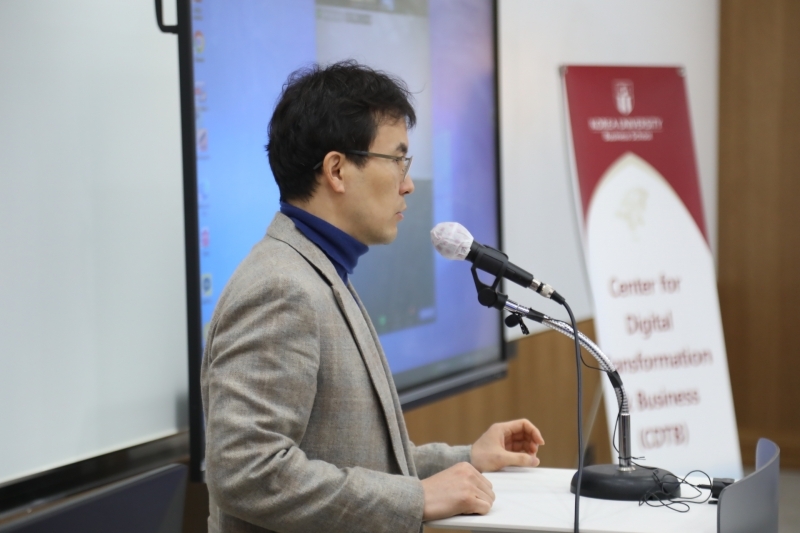
Team 7 (Woonghee Bae, Hyunbeom Kim) conducted research on 'Predicting SME Defaults and Developing Support Strategies Through Analysis of Technology Finance Information'. With technology finance serving as a crucial resource for SMEs to overcome the 'valley of death', the increasing delinquency rate in technology financing and banks' growing preference for secured loans over technology finance prompted this research topic. A Korea Credit Information Services representative praised the research as practically applicable. Professor Hwang Jun Ho highlighted the importance of financial variables in default prediction, suggesting that the research could be meaningful for practical use if financial variables were added.
Team 8 (Hojoon Yoo) presented on 'The Impact of Blue Members Activities on Vehicle Purchase Decisions: A Difference-in-Differences Approach and RFM Cluster-Based Relationship Management Strategy'. The research aimed to analyze whether Hyundai Motor Company's customer membership 'Blue Members' promotions influenced membership activities and, subsequently, vehicle repurchase decisions. Team 8 classified customers into three categories: loyal active customers, new active customers, and potential dormant customers. The analysis revealed that a single point usage by a Blue Members member increased the probability of vehicle repurchase by 0.5%. The team diagnosed that promotions related to fuel and movies should be conducted to convert potential dormant customers back into active customers. A Hyundai Motor Company representative appreciated the insights for developing a system to convert new customers into loyal ones, noting the effectiveness of the point system had been a concern. Professor Lee Hyun Seok praised the significant results achieved by the individual effort.
Team 9 (Yujin Kim, Seungeun Cha) presented a marketing strategy proposal for 'The History of Whoo' brand's successful entry into the Japanese cosmetics market. Specifically, they analyzed consumer reviews posted on a famous Japanese beauty comprehensive platform. With LG Household & Health Care looking to reduce its dependency on the Chinese market by entering Japan, Team 9 utilized data from the '@cosme' platform, which boasts over 16 million users in Japan. They conducted keyword and review analyses, suggesting focusing on promotional materials and recommendations by department store clerks as a marketing strategy. An LG Household & Health Care representative mentioned the meaningful use of the result data and planned deeper discussions on the topic. Professor Yoo Shijin praised the research's timing ahead of the market entry and the well-executed language processing in data analysis, suggesting that comparing with Korea and China in the Japanese market would be important in future research.
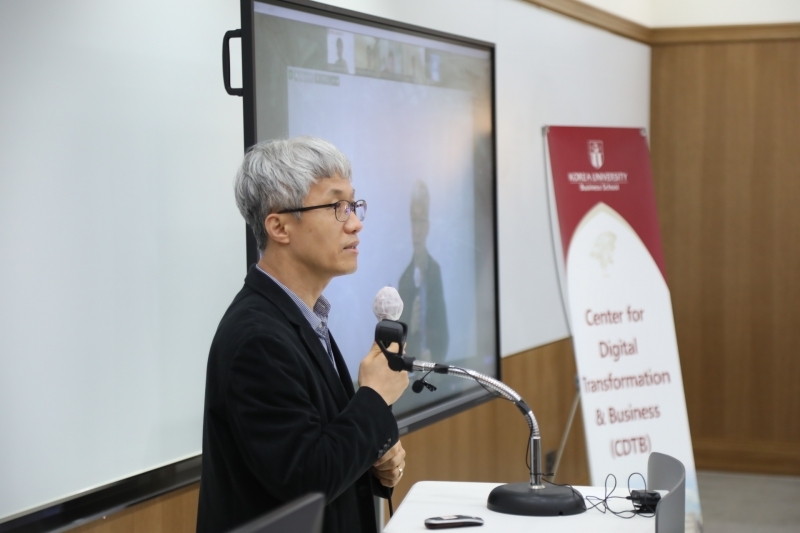
All 9 teams passed the project at the final presentation. After all presentations concluded, CDTB Director Professor Park Kyung Sam remarked, "This project was possible thanks to the continuous data and feedback from industry-academic collaboration institutions," expressing gratitude to all attendees for their participation amidst their busy schedules.


